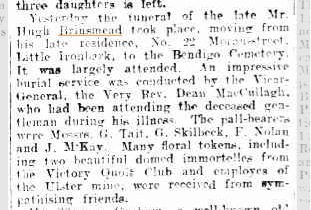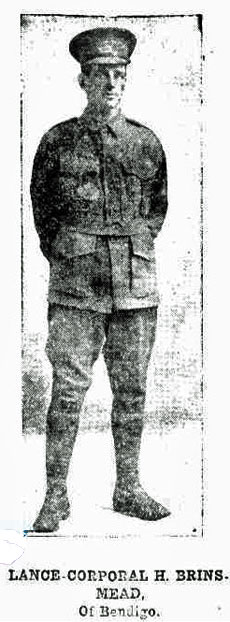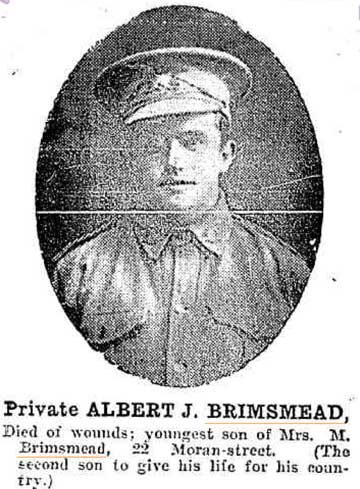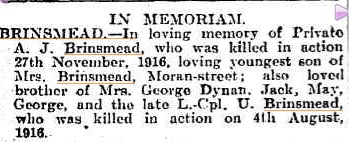Hugh Brinsmead and Mary Lynch
Hugh Brinsmead was born in Australia in 1856, the son of John Brinsmead, from Exeter and his wife Catherine Lochead. He was born at Mount Moliagul, once a thriving gold mining town but now, like many others in the area, essentially a ghost town. Hugh had an older sister, Mary Ann, who married Richard Alfred Smeaton, a younger brother William,who died at age seven, and two younger sisters who both died in infancy.
Marriage to Mary Theresa Lynch
Hugh Brinsmead and Mary Theresa Lynch were married in 1879 in what was then called Sandhurst, but is now known as Bendigo (in fact, it was originally Bendigo Creek, changed its name to Sandhurst in 1854, then voted to change it back to Bendigo in 1891). Mary was born in 1854 in Long Gully, now a suburb of Bendigo, to John Lynch and Mary MacNamara.
The family lived at 22 Moran Street, Bendigo. The couple had a total of ten children, all but one born in or nearby Bendigo. The family history was marred by repeated tragedies as the accounts of each of the children will attest.
Community Life
Hugh worked most of his adult life at the United Ulster Mine in Bendigo. Like many so employed, he eventually died from what was then called "Miner's Complaint" at too early an age.
A brief article in February, 1889 records that H. Brinsmead was elected to a committee established to support local candidate Mr. R. O'Neill. In July, 1894, H. Brinsmead was elected to be Assistant Secretary to the A.O.F. lodge. By 1902, Hugh was being congratulated on his successful term as Chairman of his Forester's Lodge, at which time he was presented with a splendidly-framed certificate and neck ribbon. The speaker particularly emphasized his courtesy in the Chair. An article in September, 1902 tells us that one of the Brinsmeads played cricket on the Buckley Street Methodist team. On St. Patrick's Day in 1903 Hugh Brinsmead demonstrated his skill at Iron Quoits. Indeed, he served as Chairman of the local Victory Quoit Club as well as Captain of its team. This was a large club with 84 members in 1904. At least one member of the family played cricket on a local team. At least one was in the Cadets. At least one of the girls played lawn tennis.
Hugh's Death
On October 29, 1908, the Bendigo Advertiser reported Hugh's death.

An old and respected resident of Bendigo, in the person of Mr. Hugh Brinsmead, passed away at his residence, No. 22 Moran- street, Little Ironbark, yesterday morning. His age was 53 years. The deceased gentleman had worked on the Bendigo goldfield for 30 years. For the past 12 months he had been a patient sufferer from miners' complaint. He was a well-known referee at all the principal iron quoit matches locally. About eight years ago a sad bereavement occurred in deceased's family, when a young son met his death by drowning in the Hustler's dam. A widow and grown-up family of five sons and three daughters are left to mourn their loss. The funeral is appointed to take place to the Bendigo Cemetery at 4.30 o'clock this afternoon.
William Brinsmead
William was the first child, born in 1880. Known as "Willie," he married a woman named Elizabeth Jane Gregory. The Sunday Times, from Perth, quaintly announced on Christmas Eve, 1905 "Intentions to commit matrimony given notice of to the Acting Registrar in Kalgoorlie: William Brinsmead to Elizabeth Jane Gregory, of Boulder." The actually married just after the New Year, in East Coolgardie, Western Australia. We do not know exactly when Willie want to the Western Australian outback, but it was probably related to the gold mining in the area. Gwalia, now a ghost town, was the home of the "Sons of Gwalia" gold mine, promoted by Herbert Hoover, later U.S. President. A W. Brinsmead applied for a prospecting licence in 1906 in Kookynie, another gold mining area turned into a virtual ghost town.
William and Elizabeth had a daughter Muriel in Gwalia, Western Australia on October 5th, 1906. Willie worked as a baker, in partnership with a D. Crane. In 1908, the local paper reported that William Brinsmead had been thrown severely from a vehicle and was shaken up and needed seven stitches. Willie died suddenly of heart failure on February 10, 1910, in Gwalia. He is buried in the Leonora Cemetry and left an estate of £790.
Mary Brinsmead
Mary, born in 1881, died in her first year.
John Brinsmead
John was born on March 6th, 1882. He appears to have been actively involved in local sporting activities. In March 1895, at 13 years old, he got into a scrape with the law, and one suspects also with his father who had to pay his 5/- fine. He had a paper round for a local newspaper. A competitor newspaper was getting complaints from customers that their papers were not being delivered. They staked out the area of Back Creek, and young Brinsmead was caught in the act of stealing a newspaper from a subscriber's garden and then bartering the paper with the local milkman for a drink of milk. the father of the boy, it was said "seemed to realize his position keenly".
Like his father, John he went to work as a Miner at the United Ulster Mine. On September 27, 1895 he suffered a serious accident while working on the surface. A piece of quartz he was lifting broke and slipped, gashing his right hand. He was taken to hospital and given stitches for his injury.
John married Clara Jean Barham and had four children, one of which, Gertrude Jean Brinsmead, died in infancy. John died when he was quite young, on December 9, 1927. He is buried in the Falkner Cemetery, in Melbourne. Clara lived to be 88 years old. She was buried at the Fawkner Memorial Park in the Roman Catholic section on May 28, 1984.
Mary Ann Brinsmead
We have gleaned little on Mary's early life. She married George Dynan and eventually, in 1919, moved to St. Kilda by Melbourne. They had at least three daughters.
Gertrude Margaret Brinsmead
Gertrude was born in 1886, but died in 1889.
Hugh Brinsmead
 Hugh Junior was born in Bendigo (Sandhurst) in 1887. He went to the Marist Brothers' School in Bendigo. In about 1911 he obtained work with the Robur Tea Company in Melbourne, which lasted until he enlisted for the War. In late October, 1915, his mother Mary was advised that her son, by then Lance-Corporal Hugh Brinsmead had been wounded at Gallipoli. In November,1915 is was reported that Hugh had disembarked in Malta. Just before Christmas that year it was reported that he was still in hospital in Malta. By March 2, 1916, Hugh had been returned to duty.
Hugh Junior was born in Bendigo (Sandhurst) in 1887. He went to the Marist Brothers' School in Bendigo. In about 1911 he obtained work with the Robur Tea Company in Melbourne, which lasted until he enlisted for the War. In late October, 1915, his mother Mary was advised that her son, by then Lance-Corporal Hugh Brinsmead had been wounded at Gallipoli. In November,1915 is was reported that Hugh had disembarked in Malta. Just before Christmas that year it was reported that he was still in hospital in Malta. By March 2, 1916, Hugh had been returned to duty.
On August 4, 1916 Hugh was killed in action at age 27. He was aboard the torpedoed transport Southland and took part in the famous engagement at Lone Pine. The newspaper account noted that Mrs. Brinsmead also had a second son, Private James Brinsmead, serving and that he had just celebrated his 21st birthday, in Egypt.
Alfred Brinsmead
 Expression of Thanks
Expression of ThanksRobert George Brinsmead
Robert George Brinsmead was born in Bendigo in 1892. We know little of his life. He went by the name George. It appears that he never married, but lived with his sister May. He worked as a labourer. The 1936 has them both living at 19 Closeburn Ave., Armadale near Melbourne. In 1949, they are at 52 Wilgah Street, Caulfield West. He died in 1953 at age 57 in St. Kilda.
May Brinsmead
In 1916, there is mention of Miss May Brinsmead participating in the quite lavish decoration of St. Killian's Hall, in preparation for the Convent Carnival, a fundraising event for improvements for the Convent of Mercy. As noted above, she appears to have lived with her brother in adulthood. She died at 72 on November 16, 1964 in Fitzroy, Victoria.
Alberta James Brinsmead
Alberta James - known as "Jim", was the youngest child of Hugh and Mary, born in Long Gully, Bendigo in 1895. Before going off to war, he worked in the Great Extended Hustler's battery. This was a major gold mine in the Bendigo area.
Alberta James left Bendigo, at age 21, on December 27, 1915, to serve in the 57th Battalion. He died from wounds suffered while fighting in France. The newspaper recounts that it was the sad task of Rev. Father Rooney to tell Mrs.  Brinsmead of her loss. In February, Mrs. Brinsmead received the following letter from Jim's friend and Sergeant. While long as such letters go, it is touching, and is set out in full.
Brinsmead of her loss. In February, Mrs. Brinsmead received the following letter from Jim's friend and Sergeant. While long as such letters go, it is touching, and is set out in full.
"France, 1st December."
"Mrs. Brinsmead, Dear Madam,—It deeply grieves me to have to convey to you the sad news that your son Jim was killed in action a couple of days ago. I assure you that you have my deepest sympathy in your hour of sorrow. I know these words must look like the ordinary stereotyped phrase coming from a stranger but I, too have had my share of sorrow since I left Australia, so I know how you must fee!. I trust you will not take this letter as presumption on my part, but I have known Jim. for many mouths, and counted him as one of my friends. Also I was his sergeant for a few months, and had already been in action with him, and cannot speak too highly of his good qualities both as a soldier and a pal—always lively and cheerful, and at all times ready to obey and carry out orders. In fact, I numbered him high up amongst my best and most reliable men and although a lad. he was a man, and a brave, one too. I am sure that even in your sorrow you must feel proud of him. I have seen him during a heavy bombardment when older men have been nervous—and I can assure you it was trying at times--Jim would be laughing and joking, and by his example steady the other men on post who were with him. On another occasion, when we had some men wounded lying out in front, I was instructed by the C.O. to call for volunteers to act as stretcher bearers, and he was one of the first to go out. On other occasions when I had to go out in front, with wire parties to repair t he entanglement he was always ready and one of the first to offer to go out with me. So you can see by these few incidents I could not look on him otherwise than as a pal. He was very unfortunate in getting hit, as his feet had got very sore with the weather, and he was going to hospital for a spell when a shell exploded close to him, and a small piece hit him, unluckily in a vital site. I collected his pay book and life and beads, and handed them to my officer. They will be forwarded to you in due course. I am enclosing a medallion which, he wore round his neck and I overlooked it when handing in his other effects. I thought you may want it as a keepsake. Two of the boys assisted in laying him to rest and I put a small cross over his grave. It was unfortunate, but it's the fortune of war, and God only knows whose turn it is next. One thing I do know is that a mother has lost a good son and others a good friend. Should it be my lot to get through safely and return. I will call and tell you more fully than I can by writing. One thing I am assured of is that you must feel proud of such a son; and let it be some consolation he died doing his duty for his country.—I remain, yours in deepest sympathy, 2896 R. Shearer, Sergeant C. Co. 57th Battalion.''
 One year later the family inserted a brief memorial notice in the Bendigo Advertiser.
One year later the family inserted a brief memorial notice in the Bendigo Advertiser.
After the War
Not long after the War ended, Mary, with her two remaining unmarried children, George and May, moved from Bendigo to the Melbourne region. The 1919 Street Directory lists the three of them living at 104 Richardson Street, Albert Park, Fawkner,Victoria. They were still there in 1924. Initially, at least they moved with and lived with married daughter Mary Ann (known as Ann) and her husband George Thomas Dynan, who worked as a wheelwright. Mary Ann Brinsmead (nee Lynch) died in Melbourne South in 1930.
